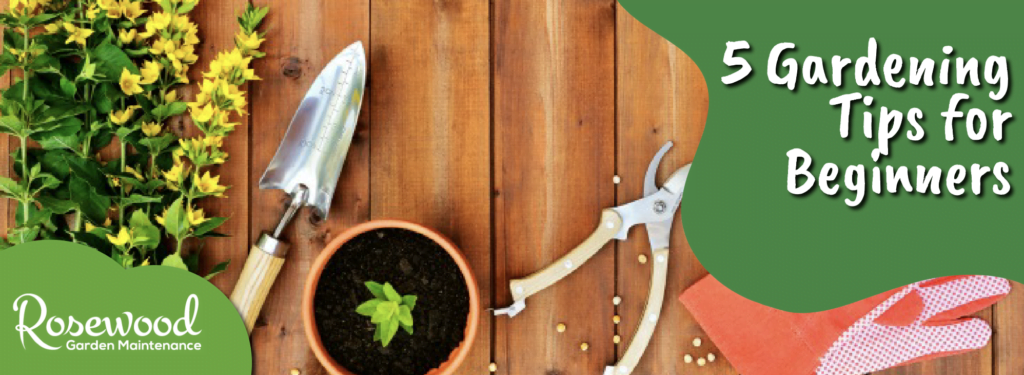
After the events of the past 2 years, many of us have taken up new hobbies to help get us through tough times. If you’ve discovered a love for all things gardening, then now is the perfect time to learn the basics before spring comes around again. Read on to learn our top ten gardening tips for beginners!
Get to know your garden
Before you start, it’s a good idea to really know your garden. It’s great to understand the basics like whether it’s north or south facing. Knowing where the sun hits the ground at certain times of the day will help you decide what to grow there! Most edible plants like fruits, vegetables and herbs need at least 6 hours of sun in order to thrive.
It’s also worth taking a look at what’s already growing to learn what type of soil you have. Camellias, magnolias and Pieris will tell you the soil is acidic. The absence of these types of plants suggests a more alkaline soil.

Know what you want to achieve
Are you looking to grow a colourful flower haven? Or are you leaning more towards raised beds to grow fresh vegetables? Do you want low maintenance or do you not mind putting in a bit of extra effort? This gardening tip is perhaps the most important because if you establish exactly what your garden goals are early on in the process, it will make it a lot quicker to achieve (not only that, but it will save you a lot of money at the garden centre!)
Water your plants correctly
There is nothing more important than watering your plants regularly. Your plants’ labels will tell you how much water they like (it’s worth keeping a list, even just one that’s in your head). Even if you don’t mulch or fertilise, always water plants appropriately and at regular intervals.
Flooding your plants with too much water occasionally will stress them and allow the disease to set in. Watering around the roots of your plants, avoiding leaves and stems, is also important. The best time to water your plants? Early in the morning or late in the evening. You’ll need to be especially vigilant during extreme weather such as a heatwave.

Choose beginner-friendly plants
Planting decent-sized shrubs is generally trouble-free as long as you follow the directions on the label. Also, if you ask your local garden centre which plants are native to your local area, this will also help ensure your gardening experience is smooth sailing. Tropical plants look stylish but can struggle to thrive in our cooler climate.
If you’re looking for flowering plants, provided your garden gets plenty of sun, a beginner will find sunflowers, poppies, nigella and pansies easy to grow… and very rewarding too!
Top tip: If you want to grow flowering plants from seed, most will need to be sown after all risk of ground frost has passed (usually after mid-April) This will mean that you get later flowers. If you want the flowers earlier in summer, you’ll need to raise seedlings in containers indoors and plant them outside from May onwards.
Don’t be afraid to grow your own
Does growing your own sound daunting? No need to panic! The truth is that some vegetables are perfectly suitable for a complete beginner to grow. Check out our recent blog on the subject. Radishes are super easy – you just sow them directly where they are to grow (after the frosts have passed) and harvest them a month later.
Peas are also an easy crop, requiring support (bamboo canes will do), and produce more pods the more you pick them. Tomatoes are also very easy and make great container plants. Just feed them regularly (every week) with tomato feed. Avoid cabbage, broccoli and aubergines if you are a beginner – they can be tricky to grow and prone to pests.

Here are some of our favourite easy crops:
Potatoes: Easy to grow and highly productive. Potatoes are categorised into three groups: first-earlies, second-earlies and maincrop. First earlies are your new potatoes, great for beginners as they are less prone to disease and pest attack and are ready to harvest earlier. Great varieties to try include Swift, Rocket and Arran pilot. Plant them in a bed, a large container or even an old compost bag with holes put in the bottom and then enjoy looking for your golden treasure in June/July.
Salad leaves: Salad leaves can be grown on a windowsill most of the year as long as there is a bit of warmth and light. Grow them in a seed tray or reuse fruit and veg containers to sow them in. Try the Cut and Come again varieties where you can keep picking and growing fresh leaves. The spicy varieties add a little something extra to your salads.
Sugar snaps: Every garden should have room for some type of pea in them. Sugar snaps are a perfect vegetable to grow for beginners as they take up a small amount of space, are really easy to grow, and most kids absolutely love eating them fresh from the pod. Plant them out in early summer and provide some support for them to climb up.
Gardening tips for beginners: a roundup
As the summer comes to an end, the jobs just keep on coming for the team here at Rosewood. A good old ‘Autumn clean’ is sometimes needed to keep your garden at bay throughout the winter months. If you think your garden could benefit from a tidy up, please do get in touch with our team! Or alternatively, you can follow us on Facebook or Instagram for more jobs we complete and helpful gardening tips for beginners and beyond.






